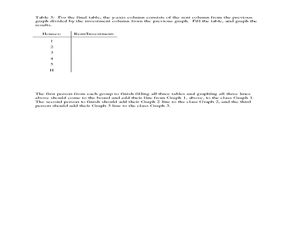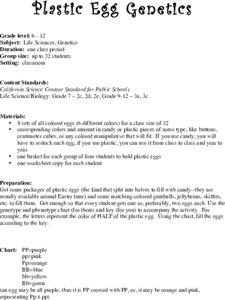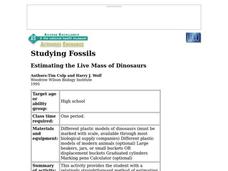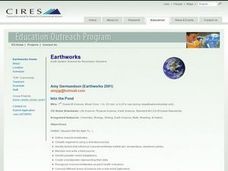Curated OER
Landforms in a Tub
Fifth graders use common household items to build landforms and simulate weathering and erosion.
Curated OER
Monopoly Graphs
Students relate the concepts of linear functions to the game of monopoly. In this algebra lesson, students solve problems with ratio and proportion. They collect data and graph it.
Curated OER
Staying Warm-Keeping Cool
In this Internet research worksheet, students go to the indicated website and read about animal habitats. Students answer 6 questions.
Curated OER
Enzymes
Tenth graders observe enzyme activity. They discuss the relationship between drug use and enzyme activity.
Curated OER
Leaf - It's What's for Dinner
Students discover correlations in food preferences of invertebrates, and assess stream health through use of kicknets, invertebrate keys, CBL systems and probes.
Curated OER
Plastic Egg Genetics
Students are introduced to the concepts of genetic dominance, recessiveness, related terms, Punnett Squares, etc.
Curated OER
Enzymes
Tenth graders test their saliva for enzyme activity. In this enzyme lesson, 10th graders conduct an experiment to test the enzymatic activity of their saliva. They relate the lack of certain digestive enzymes with alcoholism.
Curated OER
Plant Motion: The Untold Secrets
Students identify and categorize knowledge needed to design an experiment. They observe, recognize and describe the motion viewed. They document any changes caused by various solutions.
Curated OER
Estimating the Live Mass of Dinosaurs
High schoolers calculate the volume of scale model dinosaurs using a water displacement method. They use formulas to calculate the live mass each of the species of dinosaur. Then they complete and discuss a series of questions.
Curated OER
Estimating the Live Mass of Dinosaurs
High schoolers estimate the live mass of dinosaurs. Using dinosaur and modern animal models, students use simple displacement methods to calculate the volume of the models. They calculate the masses of each model. High schoolers...
Curated OER
Into the Pond
Seventh graders use a pond to explore macroinvertebrates and other organisms. They use a dichotomous key to classify the organisms and maintain a journal recording their findings.












